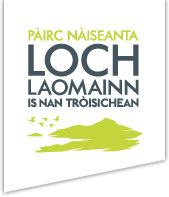
DeafBlind Scotland – Conic Hill challenge
DeafBlind Scotland is a charity whose aims are to help deafblind people in Scotland live as rightful members of their own communities and to encourage and support contact between deafblind people and sighted hearing people.
They work with partners to improve the quality of life of deafblind people and raise awareness of both the needs and potential of deafblind people.
Deafblind Scotland works with adults who are dual sensory impaired, many of them having become dual sensory impaired later in life.
The challenge
In 2013, 2014 and 2015 a group from Deafblind Scotland set themselves a massive challenge to conquer Conic Hill. What made the achievement even more special was that all of the members have dual sensory loss affecting communication, mobility and intake of information making the simplest of steps challenging. The group were joined by specialist communicators, guide and hearing dogs and National Park Rangers who helped them up the hill to the summit, step by step.
This was not an easy task for our members given their sensory impairment. It is hoped that the challenge will inspire other deafblind people to get out and about and enjoy Loch Lomond and The Trossachs National Park. – Suzanne Abbate, Operations Manager with Deafblind Scotland
The support
All of the information in the National Park Visitor Centre in Balmaha is available in Braille, moon, audio, British Sign Language and large print making it accessible. The interpretive panels have also been translated into a number of other languages, enabling more visitors to engage with the National Park.
Deafblind people are normally socially isolated and lack opportunities to experience the National Park and Balmaha Visitor Centre.
They learned about the wildlife, the geography and the history of the Park and it brought people from various age groups, genders, religions and cultures together for a social and educational experience.
“The Park is a resource that some of the deafblind people had never visited, they all enjoyed the experience and their day out. It improved their health and wellbeing and give them a sense of achievement, a boost to their confidence.” – Suzanne Abbate, Operations Manager with Deafblind Scotland
The impact
The resources provided by the National Park, both Ranger support and the educational travel grant, enable DeafBlind Scotland to continue to offer this challenge to its members.
It also helps the National Park achieve our Equality Outcome – a greater diversity of people, including young people and those who have a real or perceived barrier to accessing the Park, will learn about and help to conserve and enhance the Park.
Deafblind people can spend many hours isolated in their own homes as a result of their sensory impairments It is hoped that the challenge will inspire other deafblind people to get out and about and enjoy the National Park.
“I really enjoyed it. I had 1 or 2 slips but that is part of it. I think it’s a great experience for the members. I think it is important to have a positive attitude and realise what you can achieve.” – Michael Anderson, 72, from Stenhousemuir is blind and hears with the help of aids

